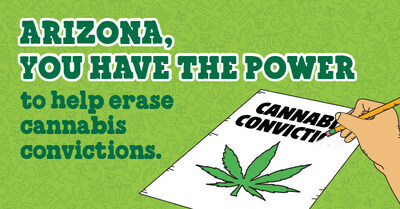It’s high time to do more about cannabis criminalization and the disproportionate way it continues to affect communities of color. This 4/20, nationally and locally lead with ACLU and AZ Justice Project, respectively, Ben & Jerry’s is focused on one message: Legalization without justice is half baked.
“To truly achieve cannabis justice, we have to ensure people are no longer haunted by these convictions.”
The Vermont ice cream maker is supporting ACLU’s call for state governors across the country to grant sentence reductions or pardons, legally known as clemency, to people serving cannabis-related sentences. Even in states like Arizona, which legalized cannabis use and voted for expungement in 2020, there are still at least 200,000 people with cannabis convictions on their records.
“It’s not enough to decarcerate people convicted for cannabis-related offenses. To truly achieve cannabis justice, we also have to do what’s necessary to ensure people are no longer haunted by these convictions,” said Palika Makam, Ben & Jerry’s U.S. Activism Manager. “Countless people are still incarcerated and continue to be burdened by convictions for cannabis-related offenses even in states where cannabis is legal.”
Criminal records block access to the jobs, housing, education, economic opportunity, and civic participation that allow participation in communities. That’s why Ben & Jerry’s is partnering with AZ Justice Project to compel elected prosecutors in Arizona to actualize conviction expungement. The organization uses a two-pronged approach providing outreach and free legal assistance.
“As public servants who wield great power, prosecutors are in a better position to help more people reach expungement. They have the ability to file a petition without input from the person who has the record. Prosecutors also have greater access to case records and other agencies keeping relevant records like the Department of Public Safety. Expungement gives prosecutors the opportunity to use their power to correct past injustices, rather than solely charging crimes and locking people up,” said Martin L. Hutchins Jr. AZ Justice Project’s Marijuana Expungement Program Manager.
“Everyone should have a fair opportunity to make a living, take care of their families and participate in their communities. That’s why it’s so important that we focus on expungement and clemency in addition to tackling the entrenched systemic racism that allows for the disproportionate arrests and convictions of Black, Indigenous, and Communities of Color for cannabis-related issues,” said Makam.
Cannabis justice is possible when the work is done in the community. Letter engagement works. Thanks to tens of thousands of letters sent to lawmakers the past five years, progress was made possible in states like Oregon, where convictions were expunged and millions of fines forgiven, and nationally when President Biden restored the rights of thousands of people with cannabis convictions.





















